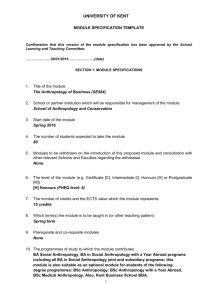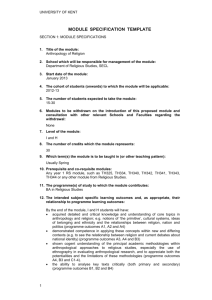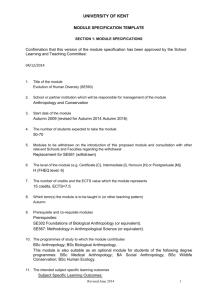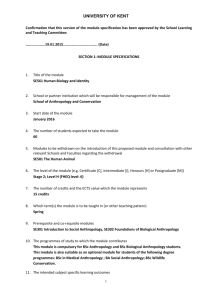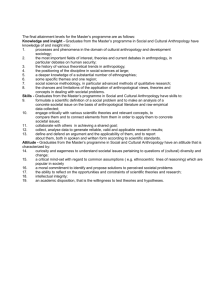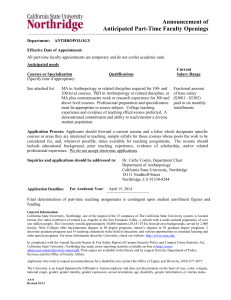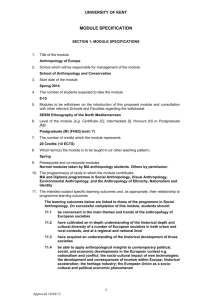University of Kent
advertisement
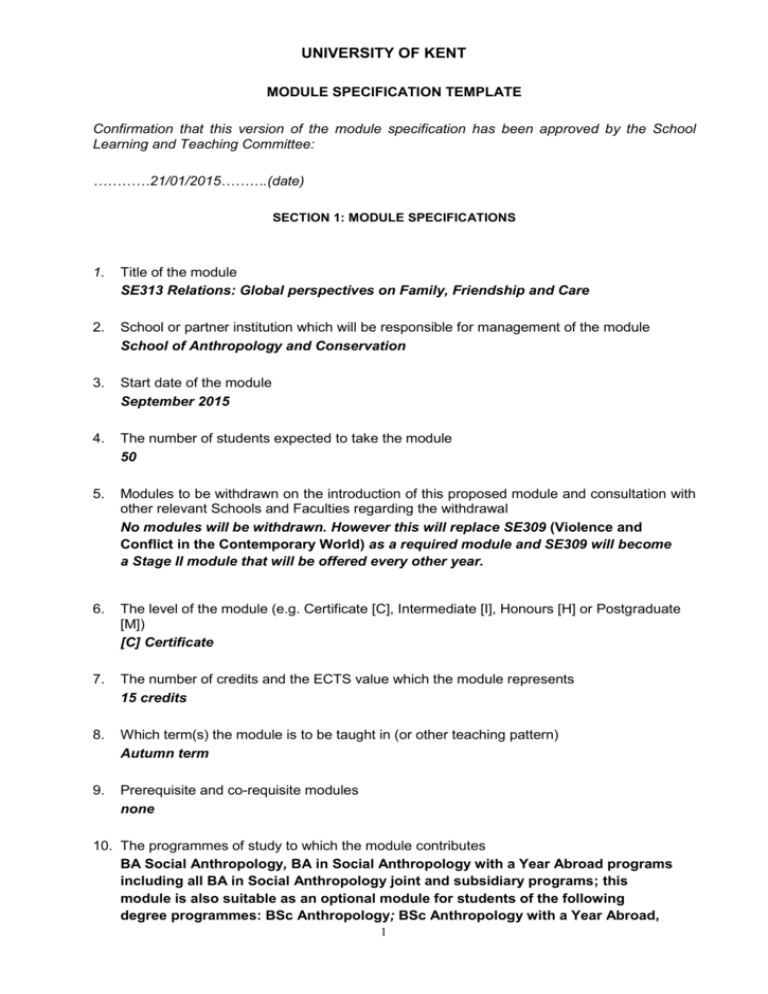
UNIVERSITY OF KENT MODULE SPECIFICATION TEMPLATE Confirmation that this version of the module specification has been approved by the School Learning and Teaching Committee: …………21/01/2015……….(date) SECTION 1: MODULE SPECIFICATIONS 1. Title of the module SE313 Relations: Global perspectives on Family, Friendship and Care 2. School or partner institution which will be responsible for management of the module School of Anthropology and Conservation 3. Start date of the module September 2015 4. The number of students expected to take the module 50 5. Modules to be withdrawn on the introduction of this proposed module and consultation with other relevant Schools and Faculties regarding the withdrawal No modules will be withdrawn. However this will replace SE309 (Violence and Conflict in the Contemporary World) as a required module and SE309 will become a Stage II module that will be offered every other year. 6. The level of the module (e.g. Certificate [C], Intermediate [I], Honours [H] or Postgraduate [M]) [C] Certificate 7. The number of credits and the ECTS value which the module represents 15 credits 8. Which term(s) the module is to be taught in (or other teaching pattern) Autumn term 9. Prerequisite and co-requisite modules none 10. The programmes of study to which the module contributes BA Social Anthropology, BA in Social Anthropology with a Year Abroad programs including all BA in Social Anthropology joint and subsidiary programs; this module is also suitable as an optional module for students of the following degree programmes: BSc Anthropology; BSc Anthropology with a Year Abroad, 1 UNIVERSITY OF KENT BSc Medical Anthropology. 11. The intended subject specific learning outcomes On successful completion of this module students should: 11.1 Be conversant with the major theoretical positions taken in contemporary Social Anthropology. 11.2 Be able to discuss critically the evidence supporting competing anthropological theories. 11.3 Be able to connect the way anthropological debates relate to current affairs and conditions, including political, social and economic developments and historical events. 11.4 Be able to describe some of the historical development of anthropological ideas and perspectives in the 21st century 11.5 Have cultivated an in-depth understanding of the recognised topic of classic and contemporary relatedness, a subject formerly referred to as kinship studies, and to link this to various cultural contexts and vernaculars and also to other core areas within anthropology such as economics, politics and religion. 11.6 Be able to construct coherent and logical arguments, particularly in written form, which combine general theoretical writings with discussion of ethnographic data. 11.7 Be able to comprehend and develop ideas that are culturally sensitive and not ethnocentric. 11.8 Be able to present their findings orally in order to develop their ideas in forms that are non-ethnocentric, make sense of cultural and social phenomena and linked to broader issues. 12. The intended generic learning outcomes are: On successful completion of this module students should achieve: 12.1 competence in their analytic skills 12.2 the ability to write critically 12.3 an ability to synthesise the research of others and form a coherent argument 12.4 research skills of their own with which to identify and locate appropriate sources. 13. A synopsis of the curriculum The aim of this module is to introduce students to anthropological thinking on a major field of enquiry that is widely considered to constitute a mainstay core of contemporary social anthropology: systems of relatedness, formally referred to as kinship studies. Here we examine relatedness - family, friendship, community and care – as fundamental yet changing aspects of society and social 2 UNIVERSITY OF KENT organization. These topics will be dealt with from historical but mostly contemporary perspectives, providing accounts of the development of social anthropology, and demonstrating the foundational and transformational positions that relatedness continues to hold in the definition of the discipline. 14. Indicative Reading List Books: Carsten, Janet. 2000. Cultures of relatedness: new approaches to the study of kinship. Cambridge [England]: Cambridge University Press. Erdmute Alber, Cati Coe, and Tatjana Thelen. 2013. The Anthropology of Sibling Relations: Shared Parentage, Experience, and Exchange. Palgrave Macmillan, New York, US. Leinaweaver, Jessaca B. 2013. Adoptive migration: raising Latinos in Spain. Durham: Duke University Press Martin Matthews, Anne, and Judith Phillips. 2008. Aging and caring at the intersection of work and home life: blurring the boundaries. New York: Lawrence Erlbaum Associates. Sahlins, Marshall. 2013. What kinship is - and is not. Chicago: The University of Chicago Press. Savage, Dan. 2005. The commitment: love, sex, marriage, and my family. New York: Dutton. Journals: American Ethnologist, American Anthropologist, Cultural Anthropology, Current Anthropology, Ethnos, Journal of the Royal Academy of British Social Anthropology and others. 15. Learning and Teaching Methods, including the nature and number of contact hours and the total study hours which will be expected of students, and how these relate to achievement of the intended module learning outcomes Learning and Teaching Methods: The module will consist of 24 contact hours based on a combination of lectures (12 hours) and seminars (12 hours). Seminars will build on material presented in lectures. Students will have to prepare for seminars and actively engage in critical discussion of current topics. Independent learning hours: seminar preparation (20), assimilation of material presented in lectures and seminars (30); additional reading (40); revision for exam (36). Total: 150 hours Achievement of module learning outcomes: Lectures will address learning outcomes 11.1 – 11.8 and 12.1, 12.3, 12.4 Seminars will address learning outcomes 11.1 – 11.8 and 12.1, 12.3, 12.4 Independent learning hours will contribute to learning outcomes 11.1 – 11.8 and 12.1 - 4 16. List each applicable assessment method and their weighting and indicate which module learning outcomes (both section 11 specific and section 12 generic) are addressed by that assessment method, as above. Assessment is by 100% coursework. The coursework components comprise an essay (40%), a class test requiring short and multiple-choice answers and factual 3 UNIVERSITY OF KENT knowledge (30%), a student ‘briefing’ in the form of a solo or joint oral presentation (15%) and lecture and seminar attendance and seminar participation (15%). The oral presentation will be carried out during the seminars. The essay (1500-2000 words) will address major theoretical debates in relation to the module. The class test will test the range of students’ knowledge of substantive issues and theoretical approaches to the subject. The class test, the oral presentation and the essay together are designed to cater to the different learning strengths of students as well as ensuring their mastery of the module’s objectives. Lecture and seminar attendance and seminar participation: Seminars are facilitated so as to be all-inclusive. Seminars will be assessed based on the weekly tracking of each student’s level of preparedness for seminars (as measured by their response to systematic broad random questioning), their oral contributions to discussion and degree of participation in the debates around which many of the seminars will be structured (as measured by their relevant oral interventions). During each session these variables are tracked on index cards as major /minor or no contribution. A major contribution is based on active involvement in debating with a demonstration of having read the material. A minor contribution is based on either the student’s ability to participate in a debate or show knowledge of the readings but not both. ‘No contribution’ is based on an inability to respond to broad random questioning and only a minimal head-nodding level of participation in debates. The formula which produces a mark for this assessment unit takes into account seminar and lecture attendance as well. Table of subject and generic learning outcomes supported by these methods: Assessment Method Subject Learning Outcomes Generic Learning Outcomes Class test 11.1, 11.3-11.7 12.1, 12.3-12.4 Essay 11.1-11.7 12.1-12.4 Oral Presentation 11.1-11.3, 11.5-11.8 12.1, 12.3, 12.4 Class Participation 11.1-11.8 12.1, 12.3, 12.4 17. Implications for learning resources, including staff, library, IT and space Additional books will need to be purchased so as to provide continual up-to-date materials for this module, including visual materials. These expenditures are covered by the School’s library budget as well as through our journal subscriptions. Also the existing Library and IT resources satisfy at least 50% of required materials. 18. The School recognises and has embedded the expectations of current disability equality legislation, and supports students with a declared disability or special educational need in 4 UNIVERSITY OF KENT its teaching. Within this module we will make reasonable adjustments wherever necessary, including additional or substitute materials, teaching modes or assessment methods for students who have declared and discussed their learning support needs. Arrangements for students with declared disabilities will be made on an individual basis, in consultation with the University’s/Collaborative Partner’s (delete as applicable) disability/dyslexia support service, and specialist support will be provided where needed. 19. Campus(es) where module will be delivered: Canterbury If the module is part of a programme in a Partner College or Validated Institution, please complete the following: 20. Partner College/Validated Institution: 21. University School responsible for the programme: 5 UNIVERSITY OF KENT SECTION 2: MODULE IS PART OF A PROGRAMME OF STUDY IN A UNIVERSITY SCHOOL Statement by the School Director of Learning and Teaching: "I confirm I have been consulted on the above module proposal and have given advice on the correct procedures and required content of module proposals" ................................................................ .30/01/2015............ Director of Learning and Teaching Date Dr. TATYANA HUMLE ………………………………………………… Print Name Statement by the Head of School: "I confirm that the School has approved the introduction of the module and, where the module is proposed by School staff, will be responsible for its resourcing" ..30/01/2015...................................... ...... Date . ................................................................ Head of School Prof Joao Pina de Cabral ……………………………………………………. Print Name SECTION 3: MODULE IS PART OF A PROGRAMME IN A PARTNER COLLEGE OR VALIDATED INSTITUTION (Where the module is proposed by a Partner College/Validated Institution) Statement by the Nominated Officer of the College/Validated Institution (delete as applicable): "I confirm that the College/Validated Institution (delete as applicable) has approved the introduction of the module and will be responsible for its resourcing" ................................................................. .............................................. Nominated Responsible Officer of Partner College/Validated Institution Date 6 UNIVERSITY OF KENT …………………………………………………. Print Name ………………………………………………….. Post …………………………………………. Partner College/Validated Institution Module Specification Template Last updated July 2014 7
